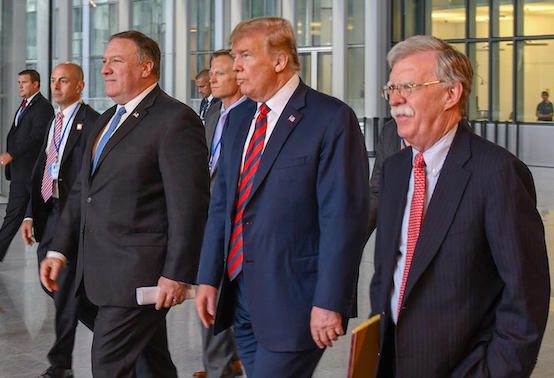Despots and Double Standards

Jack Detsch follows up on Mike Pompeo’s reference to Jeane Kirkpatrick near the end of his mendacious pro-Saudi propaganda op-ed last week:
Don’t look for Kirkpatrick-themed book clubs to pop up in the halls of the State Department or the White House, either. A former US official who served under the Trump administration told Al-Monitor that Pompeo’s reference to Kirkpatrick appears to be searching for ideological moorings for decisions that are being made by the president, not a doctrine that’s guiding the administration [bold mine-DL].
“As the president cozied up to various autocrats, it just became clear to appointees that standing up for human rights wasn’t a good strategy if they were personally ambitious,” the former official said. “Nobody wanted to be out on a limb and have the president cut that limb off.”
As the report makes clear, Pompeo’s invocation of Kirkpatrick’s “Dictatorship and Double Standards” essay was just an opportunistic name-drop that the Secretary of State used to lend his embarrassing shilling for the Saudis a little bit more respectability. Whatever one thinks of the merits of Kirkpatrick’s original argument, it is doubtful that she would have approved of Pompeo’s fawning treatment of the Saudi government.
It’s also not clear that Kirkpatrick’s Cold War-era argument is still all that relevant when thinking about U.S. client relationships in the Middle East forty years later. There is no threat to the U.S. and our allies comparable to the one posed by the USSR, and many regional clients are no longer as valuable or reliable as they once were. The questionable compromises and partnerships of convenience that the U.S. made during the Cold War are neither necessary nor desirable almost three decades after the Soviet Union ceased to exist. It makes no sense to continue applying Cold War-era rationales to policies in a very different world. Kirkpatrick herself hoped that the end of the Cold War would mean that the U.S. could return to being a normal country:
The time when America should bear such unusual burdens is past. With the return of ‘normal’ times we can again become a normal nation.
Almost thirty years after she wrote that, it seems unlikely that she would want to rationalize support for a foreign despotism in order to continue U.S. entanglement in an atrocious war that serves no American interests. If Kirkpatrick were here today, I suspect she would find Trump’s Iran obsession to be a baffling waste of time and resources that would be better used elsewhere.
Perhaps Pompeo’s biggest mistake is thinking that Mohammed bin Salman is “friendly to U.S. interests” when almost everything he has done since his father elevated him to be defense minister in 2015 has been inimical to our country’s interests. The Trump administration is so desperate to keep the U.S. on the side of the Saudi government in all things that they forgot to ask whether the relationship with Riyadh is worth keeping.
Comments